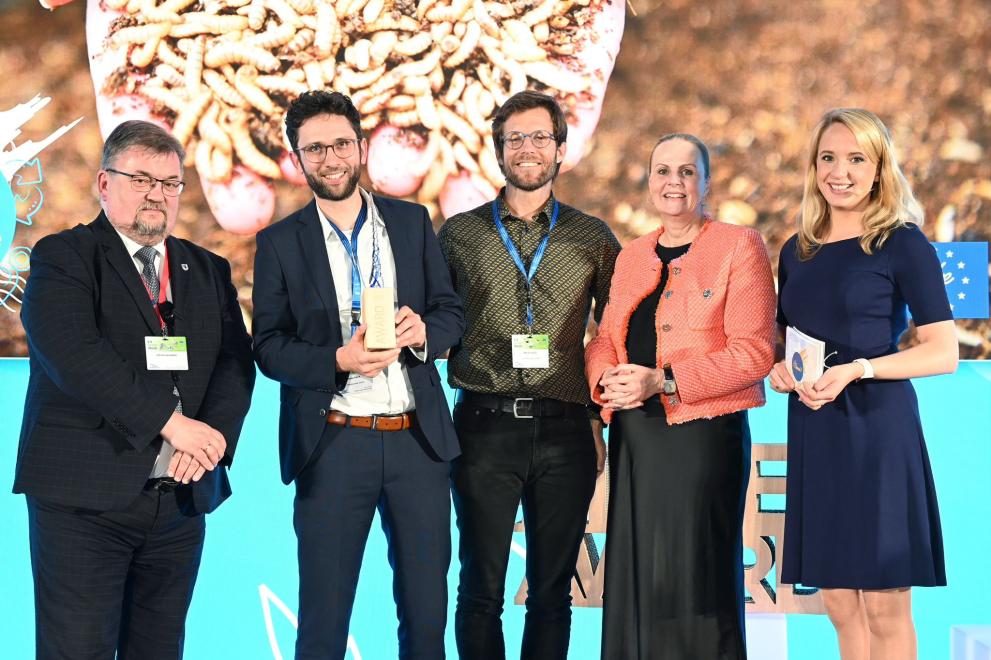
The demand for animal protein - mainly driven by rising populations and rapidly increasing livestock production - will, according to LIFE Waste2Protein, be an astonishing 75 percent higher in 2050 compared to the early 21st century.
Seventy percent of the world’s farmland is used to grow feed for animals. That’s not only a challenge for feeding hungry populations, it’s a challenge for the climate, nature, water and the environment.
“This was a long journey, and it’s not always been easy,” reflected Jonas Finck of madebymade GmbH, one of Life Waste2Protein’s project managers, as he accepted the 2024 LIFE Award for Circular Economy. “It began with a simple idea, and now with LIFE support we are operating across Italy, France and Germany. I can promise you this is just the beginning.”
The LIFE Awards - an annual celebration of the most successful projects implemented under the EU LIFE Programme - were announced at a live-streamed ceremony held in Brussels in front of a live audience during the finale of European Green Week. Finalists and winners were judged on their contribution to immediate and long-term environmental, economic and social improvements; degree of innovation and transferability; relevance to policy; and cost-effectiveness.
The four-year LIFE Waste2Protein project concluded last year and has announced some impressive results, including the first insect farm in Europe reliably processing 20,000 kilograms of biowaste per day into high-nutrient livestock feed; creating the largest (and first of its kind) bioconversion facility; and reducing the carbon footprint by a quarter compared to fish meal and by 42 percent compared to soybean meal.
“It’s super important to have these Awards, even though we can only recognise a few projects,” said DG Environment Director General Florika Fink-Hooijer. “LIFE is an incubator - it enables small-scale projects to have large-scale change. LIFE projects have fantastic solutions to everyday small and big problems, and I am so impressed by the passion and commitment that people put into LIFE projects over many years. You take an idea and you turn it into something tangible and practical which can have a big impact.”
LIFE Waste2Protein uses organic residues to produce insect protein from the larvae of Black Soldier Flies as a “sustainable and environmentally friendly alternative” to soy and fish meal. The Black Soldier Fly has been described as the star of insect farming because of its unique composting abilities and high protein content. That’s vital for a circular economy approach which aims to use resources in the most efficient way to create new value chains and exploit new revenue streams. Replacing fish and soy flour with insect protein also contributes to reducing greenhouse gas emissions (GHGs) and helps to protect and conserve biodiversity.
The flies even got their very own BSF summer camp run by LIFE Waste2Protein as part of the campaign to raise awareness about the insects’ potential. The two-day camp, held in Saxony, attracted fly breeders from all over Europe. As Jonas Finck noted, “It's great to see an idea being turned into action and that's what connects the participants of the first BSF Breeders Summer Camp. I am happy about the trustful conversations and grateful for the many new ideas we discussed.”
Runners up in the Circular Economy category were LIFE GreenShoes4All, which designed innovative, environmentally-friendly shoes to cut the footwear industry’s excessive waste and CO2 emissions; and LIFE Planet Farms, a ground-breaking air treatment, hydroponic irrigation and automated system for the EU’s first industrial-scale vertical farm. “These creative, forward thinking projects made the task of selecting a single winner a really big challenge,” commented Jacek Gajewski, Alternate member of the Kujawsko-Pomorskie Regional Assembly at the European Committee of the Regions.
The LIFE Programme is the EU's funding instrument for the environment and climate action. Since 1992 it has co-financed more than 6,000 projects across the EU and other countries. Applications are now open for €571 million worth of funding for LIFE projects in 2024.
Details
- Publication date
- 19 June 2024
- Author
- European Climate, Infrastructure and Environment Executive Agency

